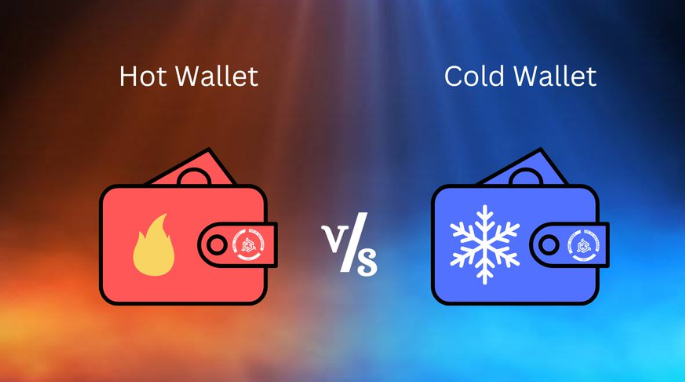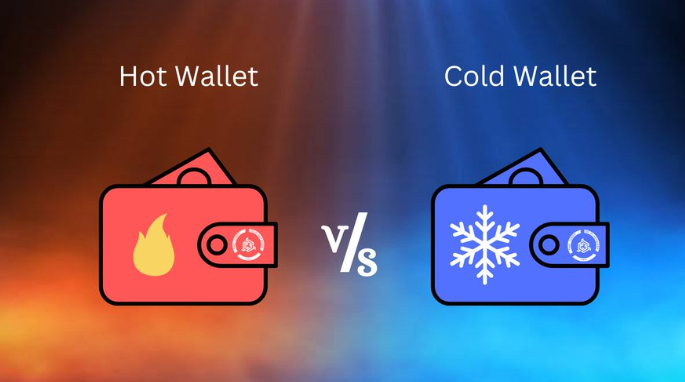Securing your cryptocurrency in 2025 remains a critical concern, with cyber threats constantly evolving. The fundamental choice for crypto storage boils down to cold wallets and hot wallets, each offering distinct advantages and disadvantages in terms of security and convenience. Many experienced investors often adopt a hybrid strategy, utilizing both to maximize both security and accessibility.
Understanding the Basics: Private Keys and Wallets
Before diving into wallet types, it’s essential to understand that a “wallet” doesn’t actually store your cryptocurrency. Instead, it stores your private keys. These cryptographic keys are what grant you ownership and control over your digital assets on the blockchain. If your private keys are compromised, your funds can be stolen.
- Public Key/Wallet Address: This is like your bank account number. You share it to receive cryptocurrency.
- Private Key: This is like your password or PIN. It’s used to authorize transactions and prove ownership. Never share your private key or your seed phrase (a series of words that can regenerate your private keys) with anyone.
Cold Wallets: The Gold Standard for Security

Cold wallets (or cold storage) are cryptocurrency wallets that are not connected to the internet. This offline nature makes them significantly more secure against online threats like hacking, phishing, and malware. They are ideal for long-term storage of significant amounts of cryptocurrency.
Types of Cold Wallets:
- Hardware Wallets:
- Description: These are physical devices that resemble USB drives, smart cards, or small smartphones. They store your private keys offline within a secure element chip. You connect them to your computer or mobile device only when you need to make a transaction.
- Key Features (2025):
- Secure Element Chips (e.g., EAL6+ certified): Dedicated chips designed to resist physical tampering and malicious attacks.
- PIN Protection: Requires a PIN to access the device.
- Shamir Backup: (e.g., Trezor Model T) Allows you to split your recovery seed into multiple shares, enhancing security by requiring a certain number of shares to reconstruct the key.
- Biometric Authentication: (e.g., D’Cent) Fingerprint scanning for an extra layer of security.
- Air-Gapped Devices: Some wallets (e.g., ELLIPAL Titan 2.0) are completely isolated from internet connectivity, using QR codes for transaction signing.
- Open-Source Firmware: (e.g., Trezor, Cypherock X1) Allows the community to audit the code for vulnerabilities, fostering transparency and trust.
- Multi-currency Support: Most modern hardware wallets support a wide range of cryptocurrencies and NFTs.
- Inheritance Features: Some (e.g., Cypherock X1) are designed to help with secure asset inheritance.
- Popular Examples in 2025: Ledger Nano X, Trezor Model T/Safe 5, D’Cent, Cypherock X1, ELLIPAL Titan 2.0, Tangem.
- Pros: Maximum security against online threats, full control over your private keys, ideal for long-term holdings.
- Cons: Less convenient for frequent transactions, typically incur an upfront cost, susceptible to physical loss, theft, or damage if not properly secured.
- Paper Wallets:
- Description: A document with your public and private keys (often as QR codes) printed on it.
- Pros: Immune to online hacking.
- Cons: Highly susceptible to physical damage (fire, water), loss, or deterioration. Considered less secure than hardware wallets in 2025 due to these vulnerabilities and the difficulty in securely generating and importing keys.
- Sound Wallets:
- Description: An unconventional method where crypto wallets are recorded and encrypted in audio files on CDs or USB drives.
- Pros: Unique security measure.
- Cons: Cumbersome to use, potentially costly, and prone to physical damage.
- Deep Cold Storage:
- Description: Involves storing hardware wallets or other offline private key backups in extremely secure physical locations, such as a bank vault or a specialized secure facility.
- Pros: Ultimate physical security.
- Cons: Impractical for regular access, reserved for very large and long-term holdings.
Hot Wallets: Convenience with Compromises
Hot wallets are cryptocurrency wallets that are connected to the internet. This connectivity makes them convenient for frequent transactions, trading, and interacting with decentralized applications (dApps) and DeFi protocols. However, their online nature exposes them to a higher risk of cyberattacks.
Types of Hot Wallets:
- Desktop Wallets: Software installed on your computer.
- Mobile Wallets: Applications on your smartphone.
- Web Wallets: Accessed through a web browser (e.g., browser extensions).
Key Features (2025):
- User-friendly Interfaces: Designed for ease of use and quick transactions.
- Multi-chain Support: Many support a wide range of cryptocurrencies across various blockchains (e.g., Ethereum, Solana, Polygon, Binance Smart Chain).
- dApp Browser/Integration: Allows seamless interaction with decentralized applications.
- Staking and Earning Features: Some offer built-in options for staking and earning interest on your crypto.
- Built-in Swapping: Often include integrated exchange functionality for quick token swaps.
- Biometric Logins: Face ID or fingerprint authentication for easier access, though still connected to the internet.
- Account Abstraction (Emerging): Enables features like gasless transactions and programmable security, making wallets more user-friendly for non-technical users.
- Self-custody: Many popular hot wallets are non-custodial, meaning you control your private keys (unlike custodial wallets offered by some exchanges where the exchange holds your keys).
Popular Examples in 2025:
- MetaMask: Dominant for Ethereum and EVM-compatible chains, widely used for DeFi and NFTs.
- Trust Wallet: Popular mobile-first wallet, supports a vast array of assets and NFTs, backed by Binance.
- Exodus: Known for its polished design and user-friendly interface, supports many cryptocurrencies and integrates with Trezor.
- Coinbase Wallet: Non-custodial wallet by Coinbase, good for beginners, integrates with Coinbase exchange.
- Guarda: Versatile, multi-platform wallet supporting a wide range of cryptocurrencies.
- Rabby Wallet: Gaining traction for multi-chain DeFi, accurate transaction previews, and gasless operations.
- Phantom Wallet: Popular for Solana ecosystem, NFTs, and dApps.
Pros:
- Convenience: Easy and fast access to funds for trading and transactions.
- Accessibility: Accessible from various internet-enabled devices.
- Functionality: Often offer a wide range of features like staking, dApp interaction, and built-in swaps.
- Cost: Generally free to download and use (transaction fees still apply).
Cons:
- Vulnerability to Online Threats: Higher risk of hacking, phishing, malware, and other cyberattacks due to constant internet connection.
- Less Suitable for Large Holdings: Not recommended for storing significant amounts of crypto long-term.
- Reliance on Device Security: Your funds are only as secure as the device your hot wallet is on.
Best Practices for Crypto Security in 2025 (Regardless of Wallet Type):
- Never Share Your Private Keys or Seed Phrase: This is the golden rule. No legitimate service or person will ever ask for them.
- Enable Two-Factor Authentication (2FA): Always enable 2FA on all your crypto accounts (wallets, exchanges). Use authenticator apps (e.g., Google Authenticator, Authy) over SMS-based 2FA, which is vulnerable to SIM swap attacks.
- Use Strong, Unique Passwords: Create complex and unique passwords for all your crypto-related accounts. Use a reputable password manager.
- Beware of Phishing and Scams:
- Verify URLs: Always double-check website URLs to ensure they are legitimate.
- Be Skeptical of Unsolicited Communications: Never click on suspicious links or download attachments from unknown sources.
- Social Media Scams: Be wary of fake giveaways, imposter accounts, and malicious links promoted on social media.
- Secure Your Devices:
- Keep your operating system and antivirus software updated.
- Avoid public Wi-Fi when accessing your wallets or exchanges. Use a VPN if necessary.
- Be cautious about what software you install on devices used for crypto.
- Regularly Back Up Your Wallet: For cold wallets, ensure you have multiple, securely stored backups of your recovery seed phrase (e.g., written on paper and stored in a fireproof/waterproof safe, or using a metal recovery plate).
- Diversify Your Storage: Don’t keep all your crypto in one place. A common strategy is to use a cold wallet for the majority of your holdings (long-term storage) and a hot wallet for smaller amounts needed for active trading or dApp interaction.
- Purchase Hardware Wallets from Official Sources: Always buy directly from the manufacturer’s official website to avoid counterfeit devices that could compromise your security.
- Stay Informed: Keep abreast of the latest security threats and best practices in the crypto space.
In 2025, the landscape of crypto security emphasizes self-custody and robust offline storage for significant assets. While hot wallets offer unparalleled convenience, cold wallets remain the definitive choice for safeguarding your digital wealth against the ever-present dangers of the online world. A balanced approach, leveraging the strengths of both, is often the most prudent strategy for cryptocurrency holders.
In 2025, the debate between cold and hot wallets for cryptocurrency security is less about choosing one over the other, and more about implementing a strategic, layered approach. While the inherent security advantage of cold wallets—being offline and thus immune to most cyber threats—makes them the undeniable choice for long-term storage of substantial crypto holdings, the convenience and functionality of hot wallets remain crucial for daily transactions, active trading, and engaging with the burgeoning decentralized finance (DeFi) and Web3 ecosystems.
The evolving threat landscape, including sophisticated AI-powered phishing and the emerging long-term concern of quantum computing, further underscores the importance of robust security practices. Hardware wallets, particularly those with advanced features like secure element chips, multi-party computation (MPC), and even seedless backup solutions, continue to lead the cold storage revolution, offering a blend of top-tier security with improving user experience. Hot wallets, while inherently more vulnerable due to their internet connectivity, are also advancing with features like biometric authentication and more intuitive interfaces, becoming increasingly secure for managing smaller, actively used funds.
Ultimately, the most effective crypto security strategy in 2025 involves a hybrid model: leveraging a cold wallet as your “digital vault” for significant investments and utilizing a hot wallet for day-to-day operational needs. This dual approach, coupled with unwavering adherence to fundamental security practices such as strong passwords, 2FA, vigilance against scams, and diligent private key management, provides the best defense against the ever-present risks in the dynamic world of cryptocurrency. The key is to understand your own risk tolerance and usage patterns, and then tailor your wallet choices accordingly to strike the optimal balance between security and accessibility.
If you’re interested in exploring the world of crypto trading, here are some trusted platforms where you can create an account:
🔹 Binance – A global leader in cryptocurrency trading.
🔹 Bybit – A user-friendly platform for both beginners and advanced traders.
These platforms offer innovative features and a secure environment for trading and learning about cryptocurrencies. Join today and start exploring the opportunities in this exciting space!
🚀 Want to stay updated with the latest insights and discussions on cryptocurrency?
Join our crypto community for news, discussions, and market updates: OCBCryptoHub on Telegram.
📩 For collaborations and inquiries: datnk710@gmail.com
Disclaimer: Always do your own research (DYOR) and ensure you understand the risks before making any financial decisions.




